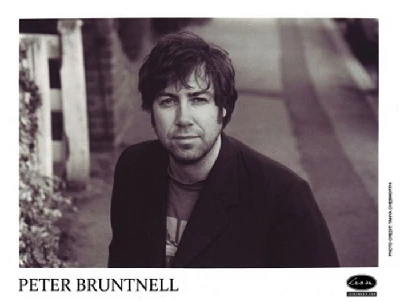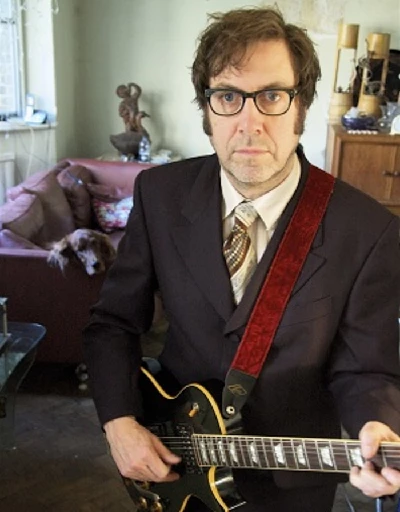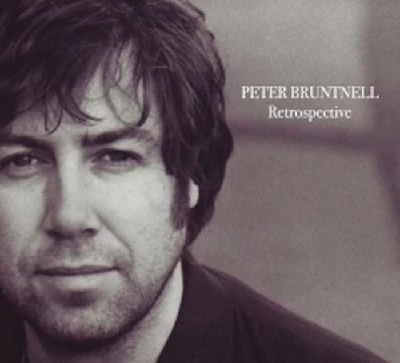published: 25 /
5 /
2013

John Clarkson speaks to much acclaimed singer-songwriter Peter Bruntnell about his forthcoming compilation album 'Retrospective' and his lengthy musical career
Article
Peter Bruntnell’s new album ‘Retrospective’ is a seventeen track compilation of his work.
Critically-acclaimed Bruntnell was born in New Zealand in 1962 to Welsh parents, but moved to Kingston upon Thames in South West London as a one year old when his father, who was a diplomat, returned to Britain.
Bruntnell began his musical career in London, spending over a decade playing tiny gigs in local pubs for beer money, and did not release an album until he was in his early thirties when he signed to Almo Sounds, who also had on their roster at the time Gillian Welch and Garbage.
He is now the veteran of ten albums – ‘Cannibal’ (Almo, 1995), ‘Camelot in Smithereens' (Almo, 1997), ‘Normal for Bridgwater (Slow River, 1999), ‘Ends of the Earth' (Black Porch, 2002), ‘Played Out' (Loose Music, 2004), ‘Ghost in a Spitfire’ (Loose Music, 2005), ‘Peter and the Murder of Crows’ (Loose Music, 2008), Black Mountain, U.F.O.’(Manhaton Records, 2011) and ‘Ringo Woz ‘Ere’ (Domestico, 2012).
‘Cannibal’ and ‘Camelot in Smithereens’ were albums of Tom Petty-esque harmonic rock. For ‘Normal for Bridgwater’, his best known work, Bruntnell, who had become interested in the pedal steel, however, switched directions and it had a strong Americana element. More recent albums have found him shifting styles again, and have been combinations of psychedelia and 60’s-influenced pop.
‘Retrospective’, which is being released on Loose Music, features tracks from all of Bruntnell’s albums except for ‘Ringo Woz ‘Ere’, and concludes with a new version of the title track from ‘Played Out’, a duet with platinum-selling artist Rumer.
Pennyblackmusic spoke to Bruntnell, who is now based in Devon, about the different levels of his career, and began by speaking about ‘Retrospective’.
PB: Whose idea was it to do ‘Retrospective’? Was it yours or that of Loose Music?
PETER: It actually wasn’t either of ours. It was a mate of mine called Jim Jones, who plays in a local band called Small Town Jones. We are good mates and it was his idea. What happened was I had just got a new manager, a bloke called James Walker. I told him about this idea that Jim had had, and he thought that it was a good idea, and so he contacted Loose, who also thought it was a good idea. They agreed to release it. It was a very easy thing to do in comparison to making a studio album because I didn’t have to go and write any songs for it.
PB: You have quite an extensive back catalogue. Was it difficult, however, to decide exactly what was going to go on it?
PETER: Yeah, it was difficult and, while I chose most of the track listing, I also had to make a few compromises here and there. Loose also had a say in what went on as well. What I did was I made my list, showed it to Tom Bridgewater who owns Loose Music, and he said, “Can we have this one and get rid of that one?"(Laughs). You can’t really win when it comes to compilations. Everyone loves a different track.
PB: You have won a lot of acclaim for your music and the diversity of it. You have always remained just under the musical radar. Has that in some ways been better for you? If you had been signed to a larger label, there might have been more pressure on you to stick to a certain career path.
PETER: No, I wouldn’t say that. I would rather be more popular and selling more records and earning more money. I don’t really earn enough money to say that I am satisfied.
PB: There have been a lot of American bands and singer-songwriters who have come over to Britain and done very well at playing music with an Americana/country sound. If you had been an American musician and come over here, you would have probably done really well.
PETER: I think there is a bit of truth in that.
PB: Is that a frustration to you?
PETER: Yeah. It has been frustrating. It is why I changed direction musically, and I became less American and country-influenced after ‘Ghost in a Spitfire’. From ‘Peter and the Murder of Crows’ onwards, my influences have been mainly English.
It was a conscious decision because I was fed up trying to compete with American singer-songwriters that were possibly not as good as I was, but because they were American would always be considered more authentic. If I do stuff that is more influenced by the Kinks or Nick Drake, then I am not going to suffer from that. I also like Nick Drake and the Kinks.
PB: You have said in interviews in the past that Nick Drake is possibly your favourite artist.
PETER: Yeah, and he probably still is.
PB: You started out in music by drawing the dole and playing pubs. How much of your sets then consisted of covers and how much of your own material?
PETER: It was all covers.
PB: Why was that? Were you writing own your material at all back then?
PETER: Yeah, but I didn’t think that it was good enough.
PB: Your first album ‘Cannibal’ didn’t come out until your were 33. What gave you that push to put out an album of your own material, and how did Almo Sounds discover you?
PETER: A fellow called Pete Smith, who is a record producer, used to drink in my local and the pub where I used to play. He used to come to watch and said to me, “Let me know if you want to do something,” and what happened was my wife got pregnant and I realised that I need to make a living fast so I phoned him up.
It was quite funny. He said, “I’ll come round and you can play me all your songs,” so I played him about fifteen songs and he only liked one song. The thing is though because I suddenly had someone going, “I like one, although the rest are shit,” it made me go and write another one and another one and another one. In the space of two weeks I wrote four songs.
I had a real reason to write them because there was a possible deal there. As he was a record producer, he knew people. All of a sudden I had to get really serious. It is amazing what can happen when you take it seriously and actually think that there is an end product.
PB: How long did it take you after he had made you this offer to get that album written and out?
PETER: Not that long. We did it in three sessions. We went in and recorded those four songs with some musicians that Pete Smith got together for me, and then it came out really well, and then I wrote another four songs, and we did the same thing about two months later. Then about another two months later we did another two.
It took six to eight months if that, and we ended up with ten songs. When we were mixing the sixth song, Pete got a guy from Almo down. He played him the stuff and he really liked it, so we knew we had a deal in the offing then.
PB: You always choose really great titles for your albums. Where did ‘Camelot in Smithereens’, your next album, take its title from?
PETER: That was the movie ‘JFK.’ It is after Kennedy has been shot and then chaos ensues. One of the guys in that film says, “Camelot in Smithereens,” and I always remembered that.
PB: ‘Normal for Bridgwater’ takes its title from a term which medical staff in Somerset used to describe people who come from the town of Bridgwater there. Where did you first hear that title?
PETER: A friend of my wife’s ran a pub in Bridgwater for a while with her boyfriend. They said that the people there were just a bit crazy, and that even in the hospital there the nurses write ‘NFB: Normal for Bridgewater’ for somebody that is a little bit loopy through in-breeding or too much sun or whatever.
That just struck me as a metaphor for somebody who has lost their mind. The song ‘Normal for Bridgwater’ takes that metaphor, but it is really about a friend of mine who killed himself.
PB: What about ‘Peter and the Murder of Crows'? That is perhaps the best title of all. How did that come about?
PETER: I wanted to call that album ‘Peter...and the something’. Do you remember that band Peter and the Test Tube Babies? I wanted to call it something like that. I was trying to think of a name, and then I overheard somebody in the pub say, “Oh no, it is the murder of crows, isn’t it?” They must have been talking about the collective noun, and it caught my ear and I thought, “Peter and the Murder of Crows. Great!” That was that (Laughs). It was just luck really.
PB: You put out your first two albums on Almo, and then you switched to the American label Slow River for ‘Normal for Bridgwater‘. You were the only British musician on that label. How did you end up signed to them?
PETER: They were attached to a UK label in London at the time, Rykodisc. I was playing a gig at The 12 Bar Club in London. Tom Bridgewater from Loose used to put on these nights there called Nashville Babylon, and he used to sometimes put me on the bill. I met the guys at Rykodisc there.
I was still signed to Almo at the time, but I had been writing some songs after ‘Camelot in Smithereens’ which because they had the pedal steel in mind were more suited to Slow River. They told me that they were interested in signing me then, and so I told my manager of the time and he had a meeting with them, and it just went from there really.
PB: ‘Retrospective’ has two tracks from most of the albums except from ‘Ends of the Earth’ which has three tracks. Why did you choose three tracks from ‘Ends of the Earth’?
PETER: I like those songs more. I just picked the songs which I liked. I didn’t want to really put two tracks from ‘Ghost in a Spitfire’ on really because it is not my favourite album. I would have put four tracks on from ‘Ends of the Earth’, which I absolutely adore, if I could have and one track from ‘Ghost in a Spitfire’ but it wouldn’t have been a fair enough representation. I had to do two tracks off it.
PB: Who is ‘Here Come the Swells’ on ‘Ends of the Earth’ targeted at?
PETER: I was living in Surbiton, and over the road from my house was a disused reservoir. The local councillors wanted to develop the area and build on it because nobody was using it. Initially they wanted to build a Tesco’s on it but all the locals objected, so in the end they built a load of houses that nobody in the area could afford to buy. They were these really posh, expensive houses in an otherwise two up, two down street. It was exactly like that Mike Leigh film ‘High Hopes’.
PB: ‘By the Time I Get My Head to Phoenix’ from ‘Played Out’ was apparently inspired by cryogenics. What was the story behind that one?
PETER: I saw a local news bulletin about a group of people in England somewhere who wanted to live forever. In this group, they were planning to send their bodies after they died to Phoenix in Arizona. They have these large cryogenic tanks in which they freeze the bodies, and intend to revive them once technology is sufficiently advanced, except this lot couldn’t afford to send a whole body because it would be too heavy, so they intended to cut their heads and then send them instead. It was on the local section of the six ‘o’ clock news, and so that is where that one came from.
PB: What was the story behind ‘K2’?
PETER: That one was written which my friend Bill Ritchie who lives in Vancouver. We write a lot of songs together over the phone, and we were trying to find words for that particular tune, and that track started to sound like it was about climbing a mountain, and so we just continued with that theme. It is not because I am particularly into mountain-climbing (Laughs). I probably got the spark for the idea again off something I got off the news.
PB: You seem to take a lot of your ideas off things that you pick up off the TV and on the news.
PETER: Yes, I do. They inspire quite a lot of what I write. Bill is, however, really into classical literature. There is usually more than one meaning to the lyrics, and that is mostly down to Bill. He likes to layer things meaning-wise. He also likes the tragedies in particular. We are doing one at the moment involving Zeus and Hades. That won’t necessarily translate to the listener. It is just a way that we can find stories to attach our lyrics to.
PB: How many of your songs do you write with Bill?
PETER: These days nearly all of them. I wrote ’Here Come the Swells’ and ‘By the Time My Head Gets to Phoenix’ on my own. I wrote all of ‘Normal for Bridgwater’ on my own, but these days I would say that I write about two on my own and about eight with him per album. It is just so much quicker and easier, and I don’t have the patience anymore. It is really hard writing ten songs with both lyrics and music in one go, so it definitely helps having Bill.
PB: Do you travel over to Vancouver to write songs with him?
PETER: I have been over about three or four times, but I actually find it easier writing songs with him from here. When I am over there, we have three weeks where we have to come up with the tunes and then get the lyrics done, so there is a lot of pressure involved. Here I can just sit around and mess around with a tune until I have a melody I like, get a few lyric ideas or not and then leave it on his answering machine to develop further.
PB: You have recently duetted with Rumer on a new version of ‘Played Out’, which is the final song on ‘Retrospective’? How did that come about?
PETER: I have known Sarah Joyce who is Rumer for years. She used to come and watch me play years ago, and all of a sudden she was on ‘Later…with Jools Holland’. When the idea for ‘Retrospective’ first came up, I was going to ask lots of friends of mine, who are more well-known than I am, if they would sing a song each for some of the bonus tracks on the album.
In the end, however, I changed my mind because I was too embarrassed to ask people, but I did phone Sarah up and asked her if she wanted to do something. She said that she would love to, and I asked what song she wanted to do, and she said ‘Played Out’ straightaway, so that was the one we ended up doing.
PB: What are your plans once ‘Retrospective’ comes out? What will you be doing next?
PETER: I am writing a new album, so I will be focusing on that and getting that out. I have got quite a bit of touring coming up. I am going to be touring in Ireland for a week and then also doing some dates in Wales. I have got a UK tour in October. I will be going to Nashville in September for the Americana Music Awards, and also will maybe be touring in America in November as well.
PB: Thank you.
Picture Gallery:-

